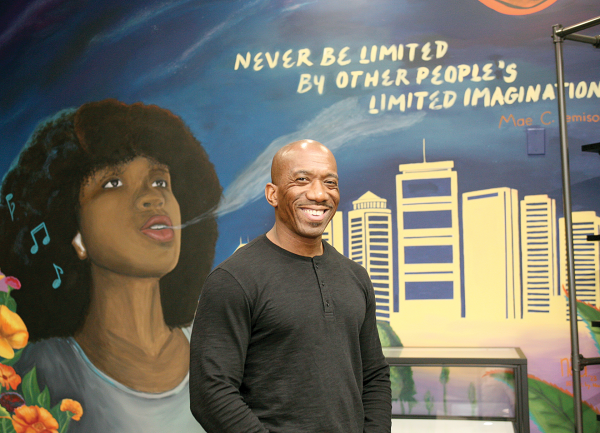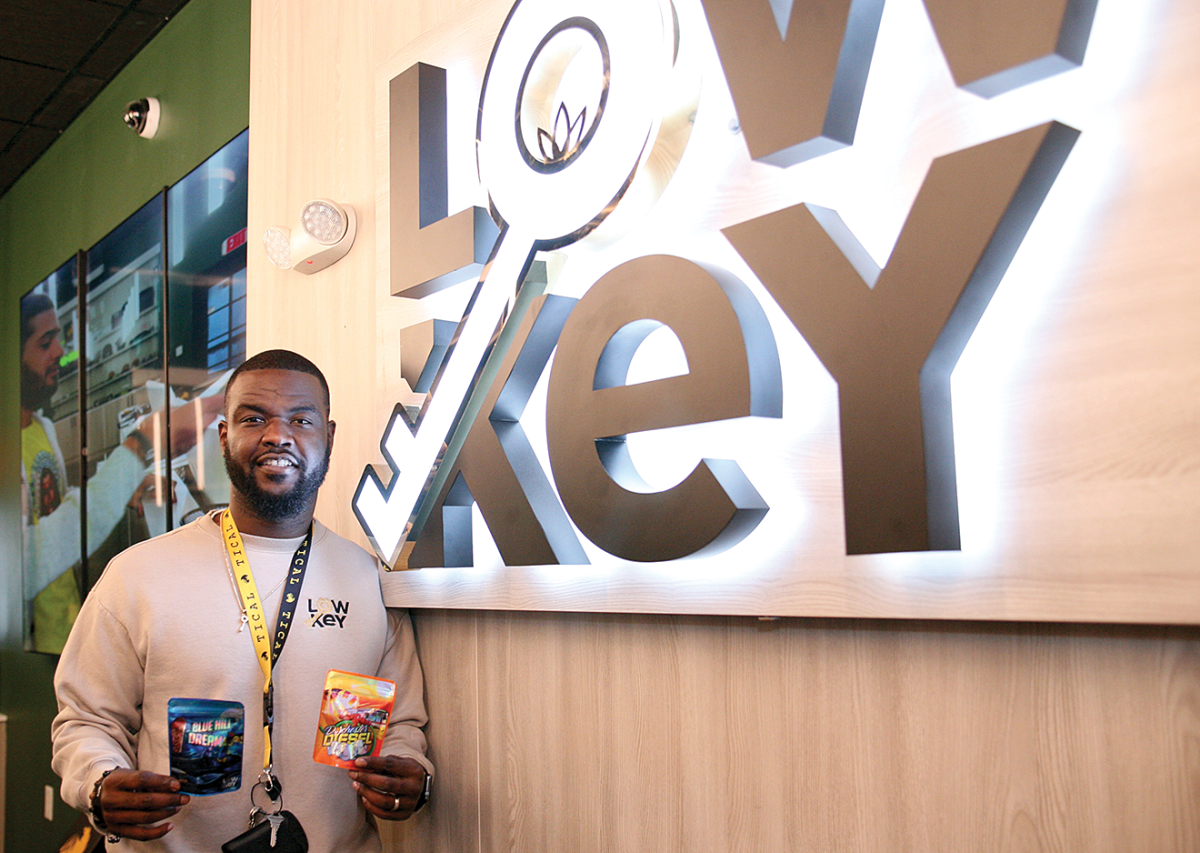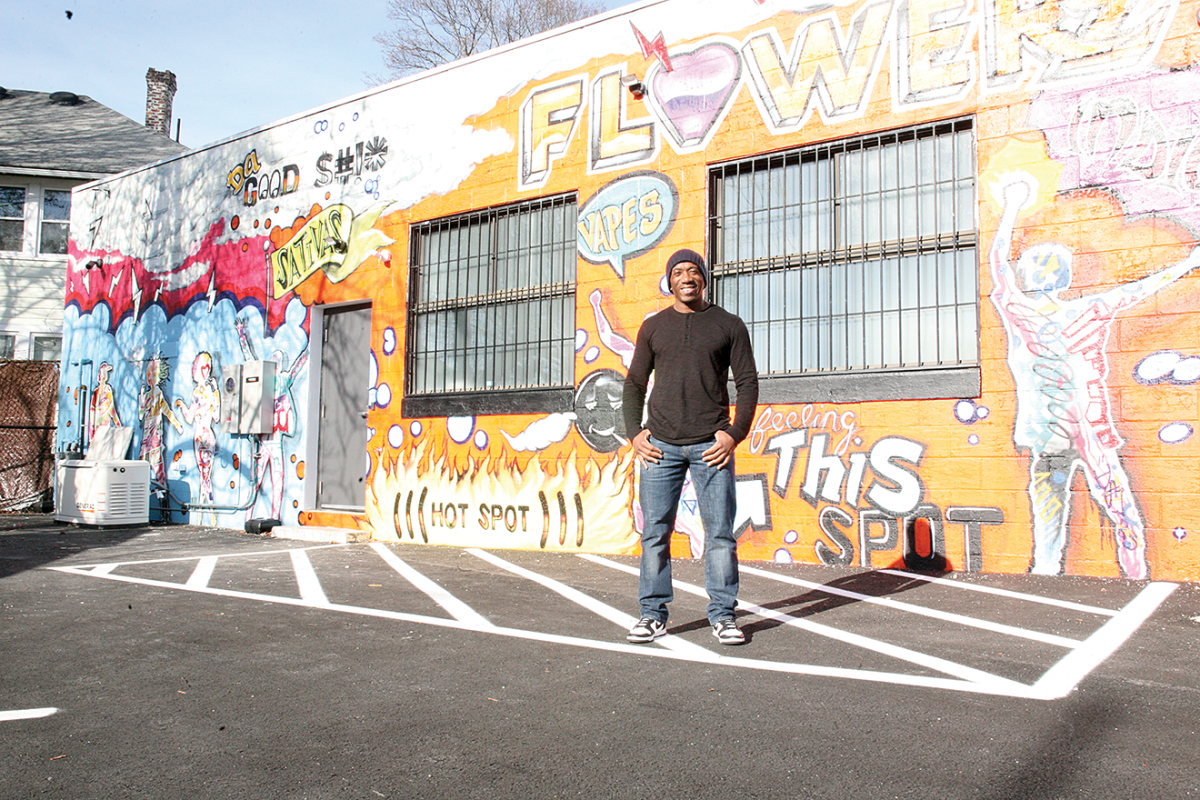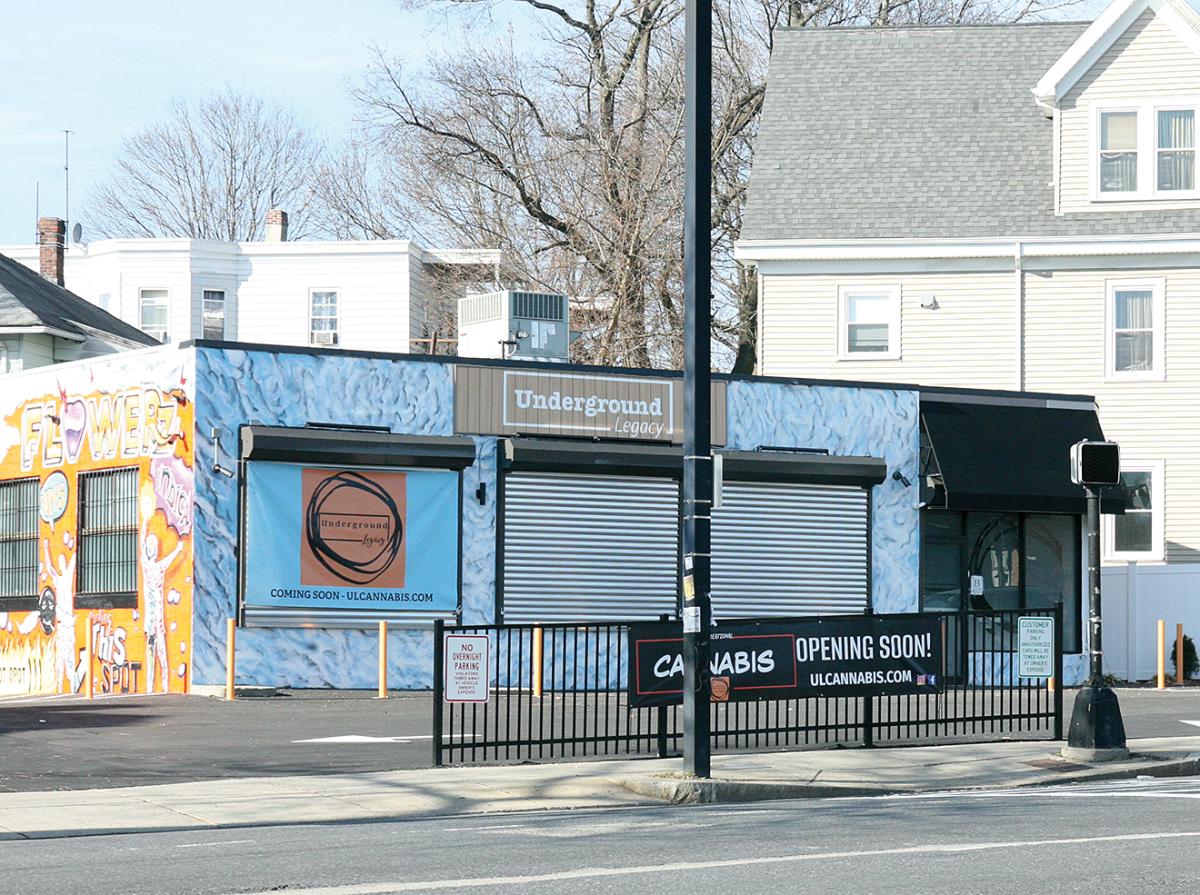December 28, 2023

Isaac Hampton, majority owner of Underground Legacy on Blue Hill Avenue plans to open within the next two months. Hampton, who grew up on nearby Walk Hill Street, has added art from local artists inside and outside the dispensary. Seth Daniel photo
With six adult-use, recreational cannabis stores now open in Dorchester and Mattapan, and several more expected to come online in 2024, local retailers are getting a better feel for the day-to-day challenges of the evolving industry and its real-world issues – tax reform, pricing, and oversaturation.
Retail locations are now open on Bowdoin Street, Freeport Street, Washington Street in Codman Square, Blue Hill Avenue in Grove Hall, Clapp Street near South Bay, and on Dudley Street near the Roxbury line. There is also a delivery-only cannabis business located in Neponset Circle.
Active proposals for new dispensary locations in the new year include a long-vacant building on Gallivan Boulevard near Neponset Circle and the Zeb Boutique on River Street in Mattapan Square, which is expected to open in early 2024. Another dispensary near Walk Hill Street and Blue Hill Avenue is weeks away from opening its doors.
“Again, anyone can open a dispensary but not anyone can run a business,” said Dru Ledbetter, co-owner of Zeb Boutique. “I am a businesswoman and that’s what I do and plan to do here.”
Brian Chavez, who operates three High Profile x Budega dispensaries on Freeport Street, Dudley Street, and in Roslindale, sees the market becoming increasingly competitive.
“I remember when we got into this early on, people quoted crazy numbers. I stayed pretty conservative and felt like we would just wait and see. Nothing is easy; I don’t care what industry you’re in. Here, you’re building from the ground up and now you do what you have to do to stand out from the competition.”

The cannabis industry in Dorchester and Mattapan reached a marked stage of maturity in 2023, and operators just opening their doors are quickly facing a saturated market. Jeff Similien, who just opened LowKey in Codman Square in November, said it isn’t enough to just sell cannabis – you must be different immediately. He said they will be debuting neighborhood strands in January – notably ‘Dorchester Diesel’ and ‘Blue Hill Dreams’ – to create a different experience.
Chavez, who opened his third location on Dudley Street last summer, is one of the more seasoned operators. Others, like Jeff Similien of LowKey Dispensary in Codman Square, opened to business last month after years of permitting and planning. While things are heading in the right direction, Similien and his Inventory Control Manager, Sam Gerver, are preparing for a market much different from when they started out.
Gerver, who was brought on by Similien because of his experience running dispensaries in other states like Colorado, said operators have to open and then focus on creating a place that’s not just a “weed store. In Denver, there were more places on the street to pick up a $5 doobie than a $5 latte,” he said.
“We know we’re headed to a very oversaturated market at LowKey. We have always said we want to create a place where people will pass by other dispensaries to get to us because they know the experience at LowKey will be far superior than other places.”
For them, the key has been to approach the store as a business from day one, and they’ve parlayed that through celebrity endorsements – such as being the sole Massachusetts partner for hip-hop star Method Man’s Tical branding.
“We’re fortunate they chose us as their Massachusetts partner and that sets us apart,” said Gerver. “It’s a big responsibility and they have entrusted us…The brand of Method Man is great, but when they experience the product we put in the package, that will get them back.”
For Chavez, whose dispensaries are known for offering “deli-style” cannabis that isn’t pre-packaged, the price fluctuations are challenging. He said there are about 20 dispensaries open in the city and he is skeptical they will attain the 52 mandated by law and continue to compete with dispensaries outside the city.
“I feel it’s a race to the bottom now with everyone cutting prices and trying to stand out,” he said. “Not long ago, we were very happy to have 1/8’s for sale at $15, but one month later so many others in the city had that same price. In Brockton, they were selling them for $8 because they have lower overhead costs. People were going all the way to Brockton to save $7.”
Chavez added that ounces once sold for $300 or $400, and now they go for $75. Likewise, the average customer when he opened spent $100 to $120 per visit, but that’s now down to $30 to $50.
“A lot of people are going to find out just securing a license and opening is not going to be enough to sustain and provide a livelihood,” he said.
That’s something Similien and Gerver found out before they opened. With only a month under their belts, they already see that the industry is headed in a downward direction in terms of pricing and product quality.
“If the industry is going to have any future whatsoever, it’s critical we don’t devalue everything and then it’s a race to the bottom that will turn into poor product across the board and non-sustainable business plans for operators,” said Gerver.
Similien said they plan to combat that prospect with great customer service and quality, unique products. In January, they will debut their Boston neighborhood-specific strands of high-quality cannabis. They will have ‘Dorchester Diesel,’ ‘Blue Hill Dreams,’ ‘Roxbury Runtz,’ and ‘Orange Line,’ to name a few.
“You have to give people reasons to come in and create a vibe and create consistency in the product,” said Similien. “It’s a lot that goes into it. It’s like building a house. You don’t just throw rooms together; you design it and talk to an architect.”


Isaac Hampton of Underground Legacy said a commitment to clean up the property and add local art inside and outside the building has been the first step in ensuring the community that he will be a trusted operator. He will likely be the only operator on Blue Hill Avenue beyond Grove Hall for some time. Seth Daniel photos
On Blue Hill Avenue, Isaac Hampton is preparing to open the doors in about a month to Underground Legacy Social Club, a “mom and pop” dispensary that has already vastly improved the aesthetics of the corner at Walk Hill Street. Having grown up on Walk Hill, Hampton said his roots in the community and the process of listening to the community before opening will help him stand out. Already likely to be the only dispensary on the Mattapan section of Blue Hill Avenue for a while, he said that operating small and within the fabric of the neighborhood is what will bring customers to him.
“A lot of people talk about social impact, and it’s become cliché but we’re really trying to be a mom-and-pop local provider for the community,” he said. “We’ve been able to get feedback from the community and developed the marketing plan around that feedback, so we believe we’ll provide what they’re looking for.”
He added, “We’re working with a lot of very small vendors to bring specialty products to the market you don’t necessarily see elsewhere…We’re small and mighty and want to work and support that market.”
Already the significant investment in the property, which was not well-maintained previously, has shown that he listened to neighbors. The property is clean and well-kept, and the building is a repository of artwork from local artists, including Ds7 and Art by Nau.
“One condition with the neighborhood process was we agreed to clean up this corner; there were a lot of maintenance issues not being dealt with,” he said. “Also living over here as a kid at one point it was a record store and gift shop, and I often patronized it. I saw it go downhill over the years and it was very personal to me getting to see these plans come together and add some curb appeal to this location.”
Ledbetter said that Zeb Boutique, which will open in a storefront on River Street, is just now starting construction on the property, having secured a provisional license in October. Using a community-driven approach, they are seeking out local investors.
“It takes longer to gather investors, but it gets you investors there for the long haul and there to support you,” she said. “A lot of people want in and out of cannabis because it feels like the green sea has opened up. The truth is any long-standing community business is going to be a benefit to the community and that’s the kind of business we want to be for Mattapan.”
Back on Freeport Street, Brian Chavez sees even bigger issues ahead – ones involving the federal government and the differing status of cannabis legality. That, he said, has allowed the very mature issue of concerns about tax reform to form among experienced operators. Not being a recognized business federally means they cannot write off business expenses or claim losses on their federal taxes – a crippling reality once dispensaries are beyond the opening stage.
“I don’t care if you’re a multi-state operator (MSO) or a mom-and-pop operator, to be sustainable in the future we’re going to need federal tax reform,” he said. “You can operate at a loss and still have a federal tax bill because you cannot fully deduct things like rent and other expenses. In essence, you didn’t make any money, but still have to pay your tax bill.”
And for those who think federal legalization will sweep in soon and solve these and other similar problems, Chavez cautions, “Don’t hold your breath.”



